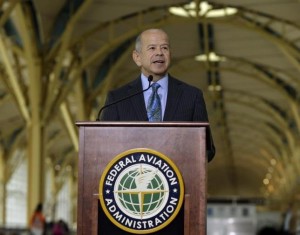The Drone Registration Task Force Report has been published on the FAA website. Outlining the reasoning behind Task Force decisions, and explaining the compromises reached, the document also calls for the FAA to accept the report as a guide for the registration system without changes.
Some members, including leading drone manufacturer DJI and the Consumer Technology Association (CTA)have released statements in support of the Task Force collaboration:
“We thank the FAA for creating a diverse stakeholder task force and appreciate the opportunity for the [CTA] and several of our members to serve on it. We applaud the spirit of collaboration and consensus-building that defines the task force and its set of recommendations to the FAA,” the CTA statement reads. “…This is a crucial time for public policy concerning drones. For the U.S. to stay competitive, and for drone-related businesses and startups to thrive, we need regulatory as well as non-regulatory solutions that support both safety and innovation. Duplicative or conflicting federal, state and local policies will encumber innovators, confuse the public and limit growth.”
DJI’s statement also reflected their approval of the collaborative approach, stating:
We hope that the work of the Task Force serves as a model for how to develop innovative and practical regulatory solutions to the issues raised by small unmanned aircraft systems. One thing this process has established is that new participants in this industry, working together with traditional stakeholders, can accomplish more, and more quickly, than past approaches. This fast-moving technology demands that we do things in new ways. We hope to have the opportunity to work with the FAA and other agencies again soon.
The recommendations do not vary from indications previously leaked to the public: all drones under 250 grams should be registered, and registration should be simple and free. (The report states that if a charge for registration is mandated by law, it should cost 1/10 of 1 cent.) The report recommends that registration be linked to operators rather than drones, and that education should be part of the registration process.
The conclusion of the task force report indicates the spirited discussion that took place to determine the recommendations. The report also makes a strong statement of hope that Task Force recommendations will not be set aside by FAA officials:
These recommendations were agreed upon in a spirit of cooperation and compromise. Many Task Force members approached the proceeding with strong convictions, derived both from their personal experience and from knowledgeable input from their organizations and users. In such a time-limited tasking, many of these convictions were necessarily set aside in order to reach a general consensus among the group and to provide the FAA with a workable solution that met its safety and policy requirements while not unduly burdening the nascent UAS industry and its enthusiastic owners and users of all ages.
Each of the recommendations for all the elements of this report required some level of compromise and mutual cooperation from various members of the Task Force. Therefore, the Task Force respectfully requests that the list of recommendations contained herein be viewed by the FAA as a holistic package, with elements of each recommendation closely interconnected with the others. Should the FAA find it necessary to significantly alter any element of its adopted registration system in a way that would contradict the findings and recommendations in this report, the members of the Task Force would respectfully request that the FAA reconvene the Task Force as soon as practicable. This would help to ensure complete industry and UAS community input into the registration system that is ultimately adopted by the agency.

Miriam McNabb is the Editor-in-Chief of DRONELIFE and CEO of JobForDrones, a professional drone services marketplace, and a fascinated observer of the emerging drone industry and the regulatory environment for drones. Miriam has penned over 3,000 articles focused on the commercial drone space and is an international speaker and recognized figure in the industry. Miriam has a degree from the University of Chicago and over 20 years of experience in high tech sales and marketing for new technologies.
For drone industry consulting or writing, Email Miriam.
TWITTER:@spaldingbarker
Subscribe to DroneLife here.








The pilots of sale model aircraft across the ountry were thrown under the bus for the sake of commercail drone use which has the largest bucks to spend and bring in when they start to fly. I will not support any drone flying over my neighborhood or over any public place and am now trying to enlist many more to do the same even before they start to fly. The Indiana Hoosiers against commercail droners is gtrowing and
we are pushing other friends and family member across the country to do likewise